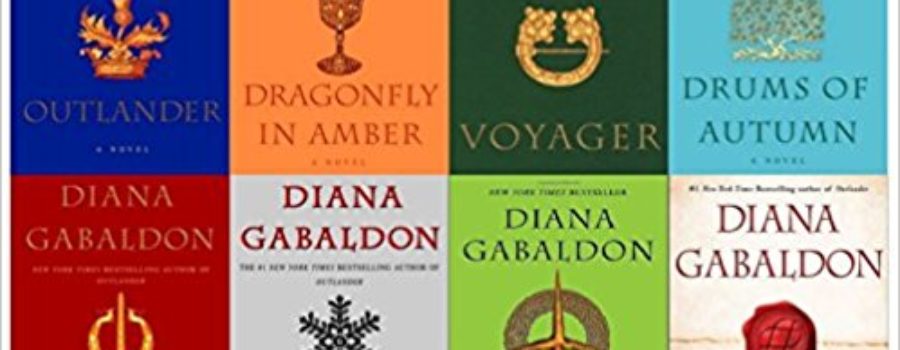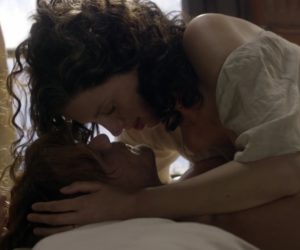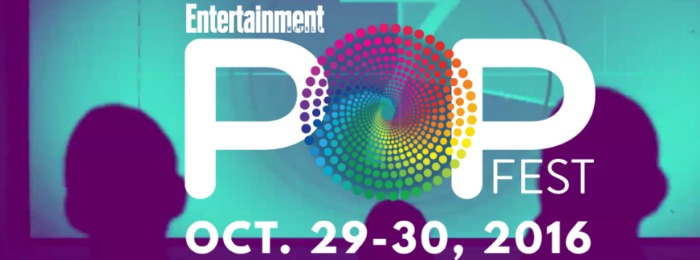Rereading Outlander is one of the great surprises and blessings of my avid reading habit. Nor am I alone. Here are a few reasons why this popular book series resonates each and every time.
I am a reading fiend. I have read just about every day of my life since I first realized Spot and Jane could run. “See Spot run! See Jane run! Run, Spot, run!” Reading is my most consistent form of self-care.
But with the exception of the years when I was a high school English teacher and needed to reread books in order to teach them well, I never read books twice for fun — until Outlander. I lasted exactly three weeks after closing the book on the last lines of Written in My Own Heart’s Blood before cracking open Outlander again. And at least two of those weeks were spent telling myself it was crazy to want to reread eight books that were each hundreds of pages long when I had just finished them and the piles of unread books by my nightstand (note I did not say on my nightstand because my reading piles go way beyond nightstand status) were multiplying like the dust bunnies under my desk (which may or may not be related to my reading habit).
And then I said, screw it and began again. That was only four years ago and I have since read the entire series twice, listened to the whole series on audiobooks once, and reread/listened to the first four books four times (I lead read-alongs in our Facebook book group so we’re reading Drums of Autumn now). More telling, I expect to continue to reread Outlander the rest of my life.
It’s been a bit of a mystery to me, this mid-life turn of reading events. What the hell is going on here?
And then I heard a professor say something that stopped me cold while listening to a show on NPR about the 200th anniversary of Mary Shelley’s amazing book, Frankenstein. (Please read it if you haven’t. It’s so much more than any movie version.) She said we reread novels because they still have something to say to us. And I realized that’s exactly it: I reread Outlander because it still speaks to me.
Like a tête-à-tête with a good friend, sometimes the conversation rehashes a familiar, shared tale, the kind you dredge up over coffee or maybe a drink. Other times, Outlander leans in like my best friend and allows me to see something in a totally new light or helps me rethink an issue in a different way.
The story of Jamie and Claire is one example. In my first read, it was all about their developing love, the amazing sex and intimacy, and watching their love unfold and evolve — all while anxiously skimming certain sections because I needed to know they would make it through whatever harrowing moment they were currently experiencing. While I suspected they would make it to book eight (and for those of you who read these books as they came out, I don’t know how you survived the five year waits in between!), I wasn’t sure exactly what their relationship would be like when they did.
In subsequent reads, though, I could relax. I knew all would eventually be well. As a result, I’ve been able to think more about their relationship — what makes it tick, why it’s so unusual, how they work to make their love last. While it would be easy to romanticize Jamie and Claire’s love and say it’s the stuff of fiction, instead, it’s made me think about love in real life. I’ve been married to the same man for 36 years, and I love him as much today as I did the first time we kissed. Our love has changed, of course, but it is steady and sure. It’s work, however, for that to be the case, and in some ways Jamie and Claire offer me a primer on ways to think about lasting love and how what happens in a book could transfer to real life. (Which is why when my husband comes to bed and sees me reading one of the Outlander books again, and asks, “Anything new?” — thinking he’s being funny — the answer, in fact is, “Yes.”)
The scene in Outlander where Jamie apologizes to Claire for spanking her is just one example. It would be easy to simply dismiss Jamie’s behavior as idealized fiction. Of course Jamie apologizes! He’s the perfect man. That can’t happen in real life! But when I step back away from that, something you can only really do in subsequent reads, I can take the time to parse that scene and think about what I could do in real life situations to actually rethink my behaviors and then, when appropriate, take action. Saying sorry is not easy for me. (I could segue into a long family history here, but this isn’t a therapy session so I won’t.) I’m not proud of this general tendency and it’s something I’ve done a fair amount of work on over the years. This scene in Outlander has offered me more insights in this. It spoke to me. It speaks to me every time I read it, reminding me that saying you’re sorry isn’t necessarily about loss, about capitulation; instead it can be about opening up and actually, potentially, result in greater understanding and a deeper relationship.
That kind of moment occurs repeatedly every time I reread one of the books in the Outlander series. Sometimes it’s the same moment, but I come away from it with yet more insight. Other times it’s a moment I missed the first time around. And in between all these moments, I simply relish in the delight of revisiting my familiar friend. As a writer, I linger over images and reread scenes (yes, I reread within the rereading!) just for the sheer joy of watching a great writer at work — and then I imagine how I might incorporate Diana Gabaldon’s expertise in my own writing.
I suspected that learning to read was a big deal, that nothing would ever be the same, that day in first grade when I excitedly banged on our back door, held up my Dick and Jane primer, and told my mother, “I can read!” And so it has been. What I never expected was how books would teach me how to live.
Do you reread Outlander? Do you ever think you’ll stop rereading? What is this book series still saying to you?















93 Comments
Leave your reply.